9 Volunteer Endangered Animal Projects Abroad
By Lavanya Sunkara
Published 11/2015, resources updated 12/6/2023 by Transitions
Abroad
If you are someone who cares deeply about the welfare of animals, there is nothing better than donating your time on a volunteer vacation. The gentle elephants in Thailand, the mighty sharks in the Pacific, the great apes in Borneo’s jungles, are among so many other animals desperately in need of our help. Pollution, deforestation, hunting, and misguided beliefs are driving too many species to extinction at an accelerating rate.
Conservation organizations around the world work tirelessly to protect and raise awareness about the plight of wildlife. Rescuing and caring for orphaned animals, aiding in rehabilitation, and reforesting are some of the activities in which volunteers can participate while making a difference. Imagine bathing elephants in a South Asian river, bottle feeding wallaby joeys in the Australian bush, and watching baby sea turtles take their first steps into the sea in Costa Rica. Your visit will also bring much needed income to needy local communities. You will make a positive impact on the lives of both animals and people while cultivating memories that will last a lifetime.
Check out these animal-related volunteer opportunities to get you started on your journey.
Cheetah Conservation Fund, Namibia
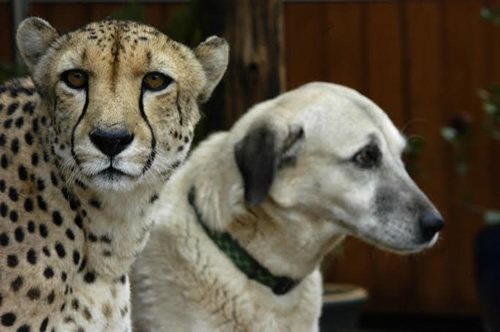
|
|
Volunteers may help with the Cheetah Conservation Fund.
|
There was a time when cheetahs lived in most African countries and in large parts of Asia, but poaching, high infant mortality, and habitat loss have caused a slide towards extinction. Currently, Namibia is the only country with the largest and healthiest population of cheetah, courtesy of years of conservation efforts. However, due to dwindling expanses of land and animals on which to prey, cheetahs are attacking livestock and paying with their lives at the hands of farmers. Cheetah Conservation Fund (CCF) has been working diligently for the past few decades to educate communities, conduct research, and utilize best land use practices to benefit both animals and people.
CCF volunteers care for the resident cheetahs and wild cheetahs held for relocation.
Cost: $3,030 for 2 weeks for working guests and $2,020 per month for student interns and zookeepers (see website). Volunteers live onsite.
Fiji Shark Conservation Project, Fiji
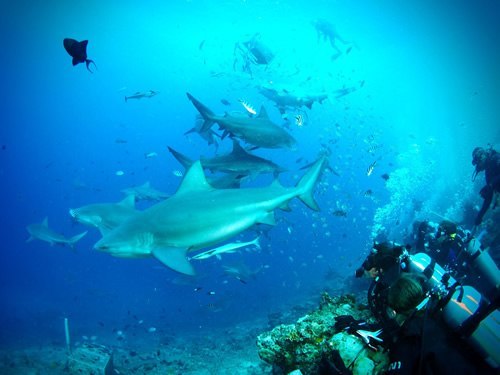
|
|
Helping endangered sharks with the Fiji Shark Conservation Project.
|
Sharks have borne a bad reputation for years, and it is time they stop dying for it. Maligned, hunted, and struggling in increasingly polluted waters, these misunderstood creatures require human intervention to battle extinction. The Fiji Shark Conservation Project, through Projects Abroad, provides shark lovers with a hands-on opportunity to make a difference. Located in Pacific Harbour, on the south coast of Fiji’s main island of Viti Levu, the project allows volunteers to work directly with shark research scientists and marine biologists.
Activities include observing and aiding with ongoing and long-term research, tagging baby sharks, shark identification, setting underwater cameras, and collecting data. Volunteers collaborate with the local community on mangrove reforestation to improve shark habitats and participate in shark educational initiatives. A love of sharks, the ability to swim, and the desire to go diving are key. Past experience with shark research is not required. Training in diving is supplied.
Cost: Price starts at $4,350 for two weeks. Meals, villa-style group accommodations, and airport transfers are provided.
The Great Orangutan Project, Borneo

|
|
Volunteers can help with Orangutans in Borneo.
|
The endangered orangutan is currently only found in the rainforests of Borneo and Sumatra. Because these longhaired, orange primates reside solely in dense forests, they are susceptible to the consequences of logging. Mining, forest fires, and hunting have also placed the orangutan in grave danger of extinction. The Great Orangutan Project, located in the Matang Wildlife Center in Sarawak, Borneo, is dedicated to reversing the damage done to these apes and their habitat. The Matang Wildlife Center is a refuge for orangutans that have been left injured and orphaned. Once the animals are healed, they are released back into the wild.
Volunteers maintain cages, feed the apes, and participate in painting, cleaning, gardening, constructing feeding platforms in the forest, and building boardwalks near ranger stations and the park. They also care for other native wildlife, including sun bears, macaques, and binturongs (bearcats). Volunteers also assist with enrichment techniques that promote natural behaviors in orangutans to enhance their potential for eventual release.
No prior experience is needed. No direct contact is allowed with the orangutans in order that these animals stay wild and less dependent on humans, unless it is required under veterinary conditions.
Cost: $1600 for two weeks and $2,494 for a month. Volunteers stay onsite.
SANCCOB for African Penguins, South Africa
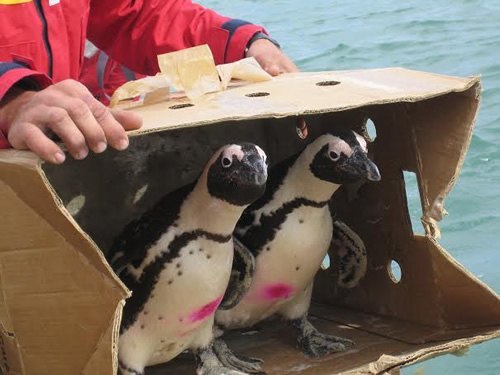
|
|
Volunteers with SANCCOB save distressed African penguins and then release them back into the wild. Photo courtesy Jane Stanfield.
|
SANCCOB (Southern African Foundation for the Conservation of Coastal Birds) in Cape Town is a marine non-profit organization devoted to saving African penguins and seabirds. Penguins are endangered due to excessive commercial fishing. A number of major oil spills at the tip of Africa in the 1970’s also impacted many of these flightless birds; they still face threats today from shipping lane traffic. SANCCOB began their efforts in 1968 and now boast a return to wild rate of 90%. Their onsite hospital is responsible for the thriving bird populations of African Penguins on Robben Island, Dyer Island, and Boulders Beach.
Volunteers are considered staff members and are required to spend a minimum of six weeks to learn necessary precautions and caring procedures for successful implementation. Daily activities include thawing fish for meals, nourishing the birds (sometimes with tubes), providing medicine, and cleaning the pool and pens. When emergencies arise, everyone puts in 12-hour days. It’s not uncommon for the hospital to be inundated with hundreds of orphaned chicks. And the best part? Releasing the rehabilitated birds back into the ocean. 6-month internships are also available.
Contact them for costs and duration. No accommodations are provided but are suggested. (See the SABCCOB Facebook page and Jane's article on volunteering with SANCCOB on TransitionsAbroad.com for more.)
Earthwatch Leatherback Turtle Conservation, Costa Rica
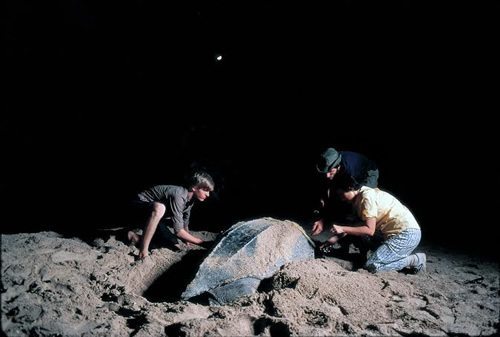
|
|
Volunteers help beached leatherback sea turtles with Earthwatch. Photo courtesy Earthwatch.
|
The population of Pacific leatherback sea turtles has declined by over 90% since 1980. Turtles often get stuck in fishnets, humans and predators harvest their eggs, and their habitats are destroyed by pollution. On Costa Rica’s Pacific coast, Earthwatch’s conservation project is collecting important data to better understand these leatherbacks.
Volunteers work in Parque Nacional Marino Las Baulas (Leatherback National Marine Park) alongside field scientists. Operating mostly on night shifts, they comb the beaches, tag the female leatherbacks, and check for nests in danger of getting washed away, carefully relocating eggs to a safe hatchery from October to mid-December. The most inspiring part is the liberation of the hatchlings — watching the tiny turtles running towards the water’s edge, disappearing into the foamy water and onwards on their voyage.
Cost: $3,050 for nine days, depending on time of the year. Accommodations are at the Goldring Marine Biology Field Station, a hub for marine research perched at the edge of the beach.
C.A.R.E Baboon Sanctuary, South Africa
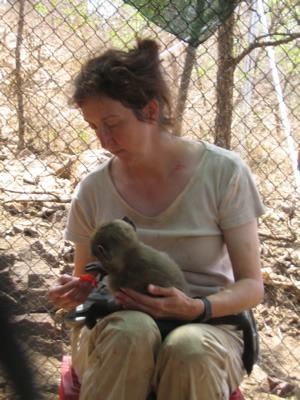
|
|
Volunteer care for young baboons in distress.
|
If you are seeking a hands-on experience, C.A.R.E Baboon Sanctuary in South Africa is your choice destination. C.A.R.E (Centre for Animal Rehabilitation and Education) has been nurturing indigenous wildlife since 1989 and, while no animal in need is turned away, special emphasis is placed on the baboon. Baboons are shot or poisoned by farmers who consider them vermin. They are captured and sold as pets in the illegal wildlife trade. Traditional doctors use their body parts and organs for supposed “medicinal properties.”
With over 400 baboons — most of which were orphaned, injured, abused, abandoned, or used in labs — currently living at C.A.R.E, volunteers are essential to the running of the sanctuary and its rehabilitation program. Tasks include preparing and bottle-feeding formula to the babies, changing their diapers, washing the bedding, playing with the youngsters, administering medicine to sick or wounded animals, maintaining the facility, and cleaning enclosures and water troughs. Because the sanctuary is located on the banks of the Olifants River in the Limpopo Province of South Africa bordering the greater Kruger Park area, volunteers have the opportunity to observe a wide variety of wildlife during their stay.
Cost: See the website and contact. Rustic accommodations are provided for 10 volunteers in a timber cabin. The Sanctuary follows a mainly vegetarian diet.
Wildlife Rescue, Western Australia
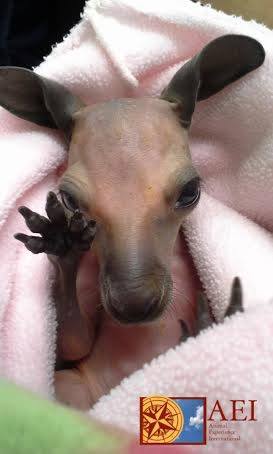
|
|
Volunteer in Australia helping a variety of native animals who are sick, injured, or displaced.
|
Visitors to the Land Down Under can admire hopping kangaroos and adorable koalas from afar, but those volunteering can get up close to these fascinating native marsupials of Australia. Adult kangaroos and wallabies are hunted for food, leaving thousands of babies orphaned. Many are killed or injured in road accidents. At the wildlife rescue center in Perth, Western Australia, volunteers live and help in the bushland caring for sick, injured, and displaced animals.
Fully qualified veterinarians or vet nurses may be involved in assessing, diagnosing, and treating hurt and ill wildlife. Standard volunteer activities include cleaning enclosures, feeding wildlife, caring for the orphaned babies, helping with administrative tasks, and assisting with education and outreach programs. Patients include echidnas, bobtails, quendas (bandicoots), red kangaroos, and birds such as the tawny frogmouth and lorikeet. Abandoned babies, such as bandicoots and possums, receive specialized care in the nurseries. Animals are released into the wild once they have been rehabilitated.
Cost: $2095 (Canadian) for four weeks. Volunteers stay onsite in a cabin. Due to very limited space, applications must be sent at least 9-12 months in advance.
Bali Sea Turtle Rescue
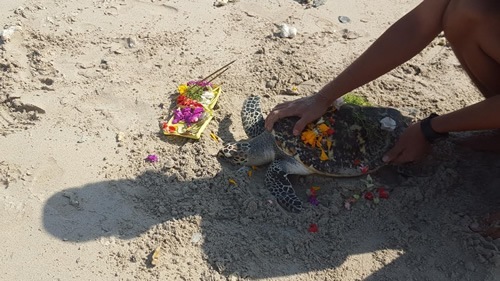
|
|
Volunteer to care for injured sea turtles in Bali received from local fisherman.
|
Our oceans are getting increasingly polluted. You may have seen distressing images of sea turtles with plastic forks and straws embedded in their noses. Thankfully, there are organizations helping to rescue these marine animals in need. On the island of Nusa Penida, a 45-minute speedboat ride from mainland Bali, GoEco volunteers work with an organization that spreads conservation-based knowledge while assisting and caring for turtles. The project receives the injured reptiles from local fisherman and cares for them until they can be released into the sea. Volunteers nurture new hatchlings until they are old enough to survive on their own. Mornings are spent with specific projects at the sanctuary, while afternoons are dedicated to the community, teaching local children about the environment and marine life care. Free time activities include yoga, relaxing at Sanur beach, trekking up volcanoes, cycling through town, and enjoying the beautiful culture of Bali. Accommodations are provided within a five minute walk from the project site.
Cost: US$950 for 2 weeks. 2-12 weeks duration.
Age: 16+
Duration:
Lavanya Sunkara is a freelance writer based in New York City. She writes about wildlife conservation and travel. Her work has appeared in The New York Times, Salon, and NBC among others. Find out more at Nature-Traveler.com.
|
